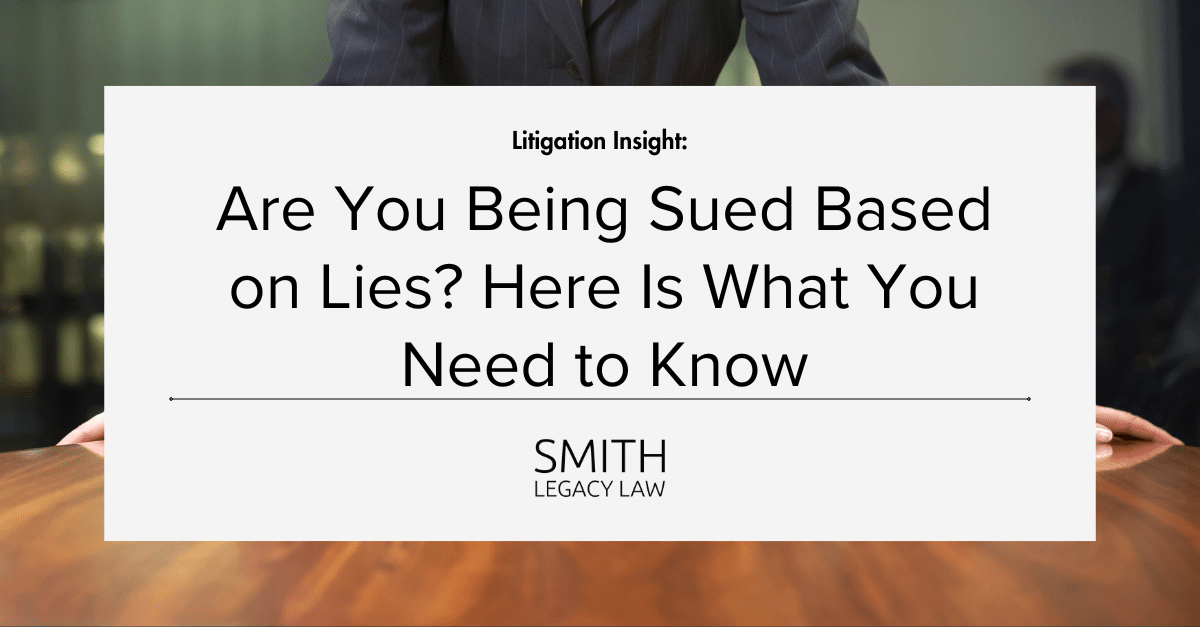You just got served with court papers, but you are being sued based on lies. The plaintiffs have made untrue claims against you, ruining your reputation and costing you money to defend yourself in court. You not only want to win the lawsuit, but you also want to hold them accountable in court and see them punished in some way. Even if you succeed in getting the frivolous case dismissed, the plaintiffs probably won’t suffer any other consequences for lying. Except in limited circumstances, the court isn’t going to call them out as liars or force them to pay additional damages to you. However, it is important to discuss your options with your attorney because you may have some recourse, and the facts could help expedite your case.
Is a Party Allowed to Present Untrue Claims in Litigation?
You cannot stop a party from suing based on lies. That’s because people have constitutional rights guaranteeing freedom of speech and access to the courts. However, plaintiffs (the party commencing the lawsuit) have to allege facts in support of their lawsuit in the complaint they file with the court and in subsequent pleadings. Further, they will be required to prove those facts in court. Depending on the nature of the false information, the case may be dismissed quickly or after discovery because the plaintiffs failed to meet their burden of proof on the facts.
This may not feel like much consolation because their lawsuit against you is still a public record. However, the faster you can get a case dismissed, the more time, money, and aggravation you save, and it leaves you free to otherwise deal with the damage done to you. In addition, you should remember that the plaintiff also had to spend money to bring a case against you, and they probably did not get much, if any, benefit from you being sued.
When Is a Party Held Responsible for Lies Made in the Course of Litigation?
Generally, the court won’t punish a party who provided information that was not true. However, there are some exceptions, as follows:
- Perjury. If a party lies under oath, it may constitute perjury. However, that is a criminal matter, and prosecutors are less likely to pursue actions against a party who committed perjury in the course of an ordinary civil case. Further, it is hard to prove perjury. It requires proof that a party willfully made a material misstatement of fact. This requires a showing that the lying party intentionally made false statements that they knew were false.
- Sanctions. Where the false information was provided to harass you, delay litigation, or involved other egregious behavior, you can make a motion for sanctions to be imposed on the other party. However, there is a high burden of proof, and even if you win, the decision could be overturned on appeal.
- Vexatious Litigation. In the most egregious circumstances, usually involving a plaintiff who repeatedly files multiple, frivolous lawsuits in order to harass or intimidate a defendant, a defendant who has successfully obtained dismissal of such actions may be entitled to bring their own case against the vexatious litigant for money damages.
- Defamation. You can sue the other party for defamation. Such claims require that you prove the plaintiff made false statements of fact about you which caused harm to your reputation. This can be difficult to prove to begin with, and defamatory statements made in court filings will usually be shielded from liability on constitutional grounds.
What Is the Best Way to Handle Someone Who Brings a Lawsuit Based on False Information?
If you are being sued and believe the plaintiff is misrepresenting facts and making false allegations about you, discuss it with your attorney. There may be grounds for a quick dismissal of the case or the opportunity to seek sanctions or other options. However, the key point is to focus on resolving the matter efficiently and obtaining a positive outcome for you, even if the plaintiff wasn’t punished in the way you would have liked. While you may not be completely happy with that result, it is the least costly and most effective way to address being sued.
Contact us to discuss how we can help you with your matter.
